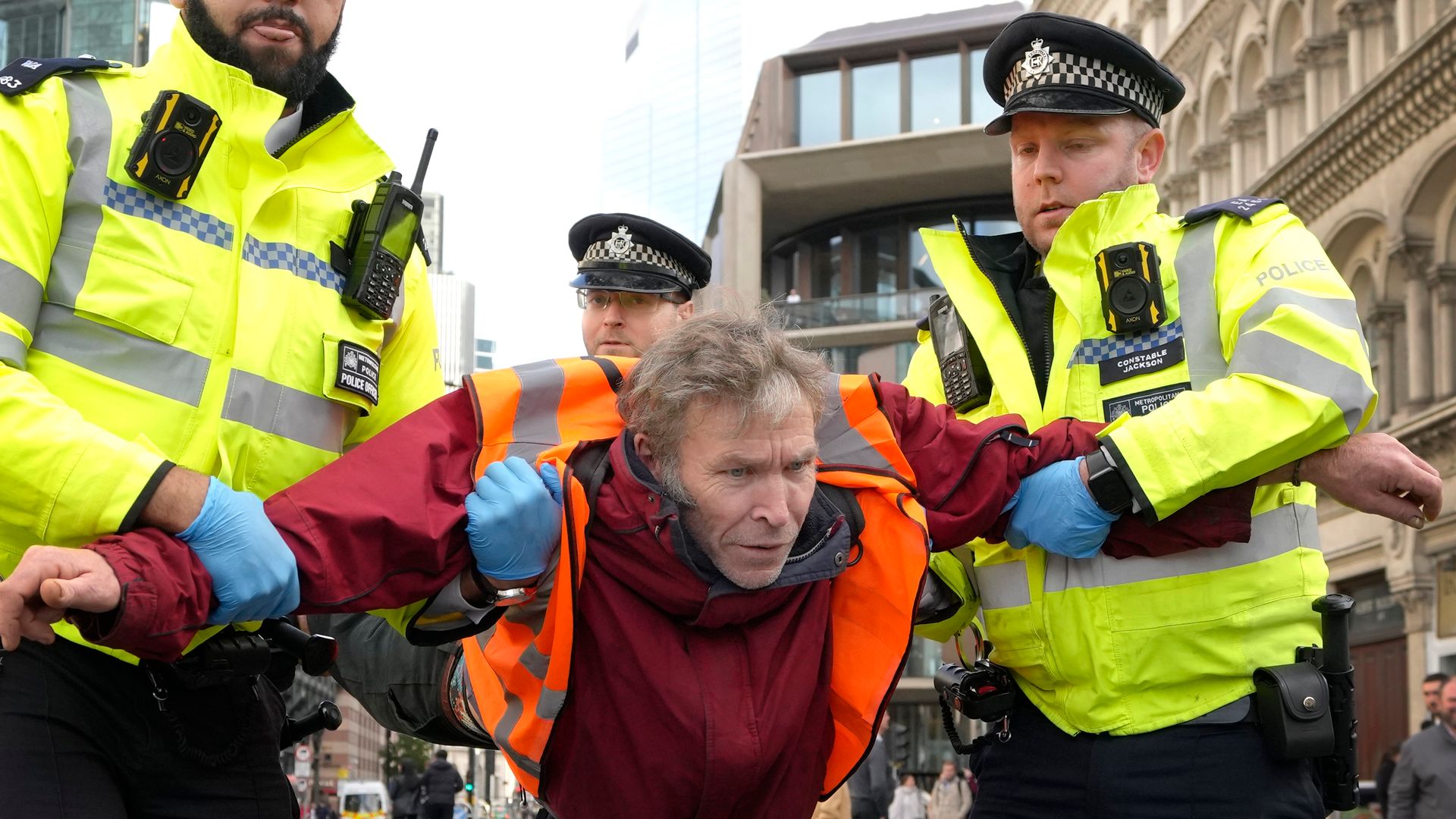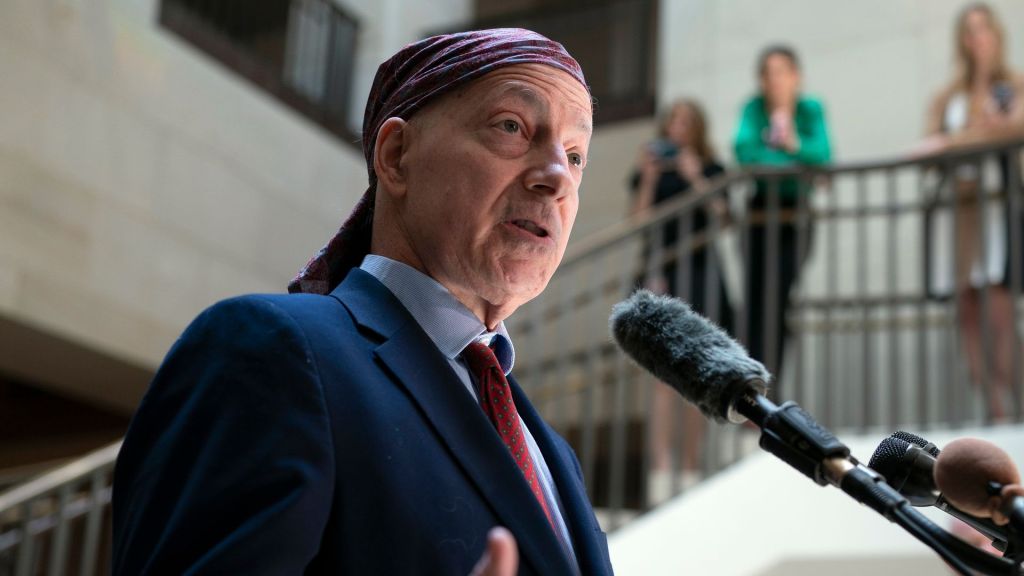
[JACK AYLMER]
BLOCKING TRAFFIC, BOARDING BOATS, DEFACING PRICELESS ART. AROUND THE WORLD, WE’RE SEEING THESE TACTICS USED TO SEND A MESSAGE.
CLIMATE ACTIVISTS SAY NOT ENOUGH IS BEING DONE TO STOP ENVIRONMENTAL ABUSES THEY BELIEVE COULD BE DETRIMENTAL TO OUR PLANET.
[GRETA THUNBERG]
“To stay below the target set in the Paris Agreements and thereby minimizing the risks of setting off irreversible chain reactions beyond human control, we need immediate, drastic, annual emission cuts unlike anything the world has ever seen.”
[JACK AYLMER]
AND SCIENTISTS WITH THE U.N. AGREE. ACCORDING TO A REPORT RELEASED THIS YEAR, WITHOUT IMMEDIATE ACTION, THE EARTH’S CLIMATE WILL SOON EXPERIENCE IRREVERSIBLE DAMAGE, THE EFFECTS OF WHICH MAY BE WIDESPREAD.
[ANTÓNIO GUTERRES]
“In short, the report shows that the emissions gap is more like an emissions canyon. A canyon littered with broken promises, broken lives and broken records. All of this is a failure of leadership, a betrayal of the vulnerable and a massive missed opportunity.”
[JACK AYLMER]
IT’S WHY ACTIVISTS SAY THEY’RE TAKING MORE EXTREME MEASURES THAN EVER BEFORE.
[PHOEBE PLUMMER]
“What I am doing is listening to what all the experts are saying we’re living in this insane world where the experts aren’t being listened to. The United Nations has called for no more oil and gas. The International Energy Agency has said we can have no new oil and gas, the IPCC report — the largest global report on the climate crisis of all — said we can have no new oil and gas. How many more experts need to say it?”
[MIRANDA WHELAN]
“I don’t think any of us want to be disrupting people’s lives. But I think, given the science and the things that academics are saying about what oil is causing around the world and in this country too, this is the level of action that needs to be taken.”
[JACK AYLMER]
BUT, AS SEVERITY OF THEIR PROTEST TACTICS HAVE ESCALATED, SO TOO HAS THE RESPONSE FROM LAW ENFORCEMENT OFFICIALS, LAWMAKERS AND THE GENERAL PUBLIC.
OVER THE LAST SEVERAL YEARS, LAWS HAVE BEEN ADOPTED IN BOTH THE UNITED STATES AND ABROAD AIMED AT DISCOURAGING THESE TYPES OF DEMONSTRATIONS.
SINCE THE 2016-2017 STANDING ROCK PROTESTS, 21 U.S. STATES HAVE ADOPTED CRITICAL INFRASTRUCTURE PROTECTION LAWS, WITH MANY SHARING LANGUAGE DRAFTED BY THE AMERICAN LEGISLATIVE EXCHANGE COUNCIL, A LOBBYIST GROUP FUNDED BY FOSSIL FUEL COMPANIES.
MEANWHILE, MEMBERS OF THE U.K.’S PARLIAMENT PASSED LEGISLATION LAST YEAR THAT GAVE POLICE NEW POWERS TO COMBAT PROTESTS AND ACTIVISM, WHILE ALSO INCREASING THE POTENTIAL PUNISHMENTS FACED FOR ENGAGING IN THESE TYPES OF DEMONSTRATIONS.
ELSEWHERE, AUSTRALIA HAS COME UNDER SCRUTINY FROM HUMAN RIGHTS WATCH, WHICH HAS ACCUSED THE COUNTRY OF DISPROPORTIONATELY PUNISHING CLIMATE PROTESTERS IN VIOLATION OF THEIR BASIC RIGHTS TO PEACEFUL PROTEST.
EVEN IN THE MIDDLE OF THE OCEAN, DEMONSTRATORS ARE BEING TAKEN TO COURT. WHEN ACTIVISTS FROM GREENPEACE BOARDED AND OCCUPIED A DEEP SEA MINING VESSEL IN THE PACIFIC, THEY WERE THREATENED WITH FINES OF UP TO NEARLY ELEVEN MILLION DOLLARS.
[SARAH METHVEN]
“These are tactics that we see used time and time again, by extractive industries against Greenpeace and other activists around the world … This is a classic intimidation tactic … and yeah, we’re undeterred by this.”
[JACK AYLMER]
IN ADDITION TO MORE SEVERE LEGAL CONSEQUENCES, ACTIVISTS SOMETIMES ALSO ENCOUNTER VIOLENT REPERCUSSIONS.
BACK IN NOVEMBER, ENVIRONMENTALISTS DEMONSTRATING AGAINST THE CONSTRUCTION OF A NEW LAW ENFORCEMENT TRAINING COMPOUND IN ATLANTA WERE MET WITH TEAR GAS AND FLASH BANG GRENADES FROM POLICE.
DUBBED “COP CITY,” ACTIVISM GROUPS SAY THE FACILITY’S CONSTRUCTION THREATENS THREE HUNDRED ACRES OF THE NATION’S LARGEST URBAN FOREST.
DOZENS OF THOSE WHO HAVE CAMPAIGNED AGAINST COP CITY HAVE BEEN ARRESTED AND CHARGED AS DOMESTIC TERRORISTS.
EARLIER THIS YEAR, ONE ENVIRONMENTALIST WAS SHOT AND KILLED BY POLICE, WHO SAY THE INDIVIDUAL IN QUESTION WAS ARMED AND HAD FIRED ON RESPONDING OFFICERS.
THE INCIDENT MARKED THE FIRST TIME IN MODERN U.S. HISTORY THAT CLIMATE ACTIVISM RESULTED IN A FATAL OFFICER INVOLVED SHOOTING.
BUT THE THREAT OF VIOLENCE AGAINST PROTESTORS HASN’T COME SOLELY FROM INTERACTIONS WITH LAW ENFORCEMENT.
LAST MONTH, AMID ANTI-MINING PROTESTS IN PANAMA, A MOTORIST FATALLY SHOT TWO PEOPLE TAKING PART IN A DEMONSTRATION THAT INVOLVED BLOCKING A SECTION OF THE PAN AMERICAN HIGHWAY.
THE NON-PROFIT GLOBAL WITNESS HAS REPORTED THAT BETWEEN 2012 AND 2022, NEARLY 2,000 ENVIRONMENTAL AND LAND-DEFENSE ACTIVISTS WERE KILLED, AT AN AVERAGE OF ONE DEATH EVERY TWO DAYS.
WITH THIS YEAR SET TO BE THE WARMEST EVER ON RECORD, THE URGENCY FELT BY ENVIRONMENTALISTS TO TAKE ACTION IS HIGH, THOUGH IT MAY ULTIMATELY LEAD TO MORE CLASHES LIKE THESE.







